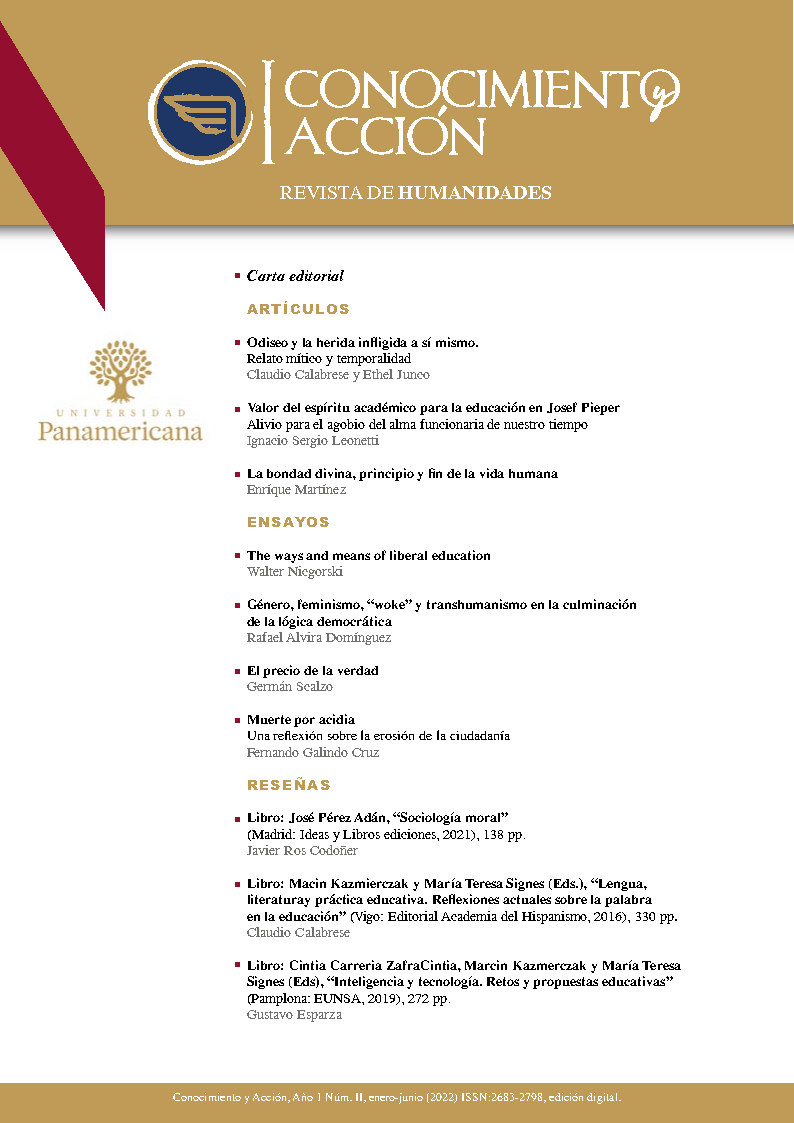Value of the academic spirit for Education in Josef Pieper: Relief for the burden of the functionary soul of our time
Published 2022-01-08
How to Cite
Copyright (c) 2022 Conocimiento y Acción

This work is licensed under a Creative Commons Attribution-NonCommercial-ShareAlike 4.0 International License.
Downloads
Abstract
The technical empowerment and materialistic turn of the past centuries have left an indelible mark on the humanity of our time. The guide that spiritual life could suppose rooted in a metaphysics that sustains it has been blurred in time with the total mechanization of life itself. Unfortunately, these circumstances are manifested in the symptom of the loss of a real communication and dialogue between people, problematically replaced by the formal - and totalitarian - language of the new advertising and proselytizing sophistics.
Against this stands the thought of Josef Pieper who urges us to recover spiritual life in the spirit of contemplation so that man can find himself and others. To do this, it traces the academic spirit in Higher Education as an essential path. All the sciences –especially when they are taught- must live “the academic” in its most original sense to be forgers of thinking souls and stop the totalitarian advance of automatism in the life of every human being.
References
- Adorno, Theodor W., Minima Moralia. Madrid: Akal, 2006.
- Adorno, Theodor W., y Horkheimer Max. Dialéctica del Iluminismo. Madrid: Ed. Nacional, 2002.
- Aquino, Tomás de, Suma de Teología, (https://www.dominicos.org/media/uploads/recursos/libros/suma/4.pdf)
- Arendt, Hannah, «Los hombres y el terror». En Los hombres y el terror y otros ensayos publicado por RBA ed., 124-138. Barcelona: 2012.
- Arendt, Hannah, «Los huevos rompen a hablar». En Los hombres y el terror y otros ensayos publicado por RBA ed., 102-123. Barcelona: 2012.
- Brie, Roberto, Los hábitos del pensamiento riguroso. Bs. As.: Ed. Del viejo aljibe, 1998.
- Camus, Albert, El hombre rebelde. Bs. As.: Losada, 2003.
- Foucault, Michel, «Nietzsche, Freud, Marx», ECO. Nº113-115 (1969): 33-48.
- Jünger, Ernst, Sobre los acantilados de mármol. Bs. As.: Tusquets ed., 2008.
- Lewis, Clive S. La abolición del hombre. Barcelona: Ed. A. Bello, 2000.
- Manguel, Alberto, El viajero, la torre y la larva. El lector como metáfora. Bs. As.: FCE, 2015.
- Nietzsche, Friedrich, Sobre verdad y mentira en sentido extra-moral. Bs. As.: Miluno, 2012.
- Pieper, Josef. «Abuso de poder, abuso de lenguaje», en La fe ante el reto de la cultura contemporánea publicado por Rialp, 213-235. Madrid: 1980.
- Pieper, Josef, El ocio y la vida intelectual. Madrid: Rialp, 1997.

